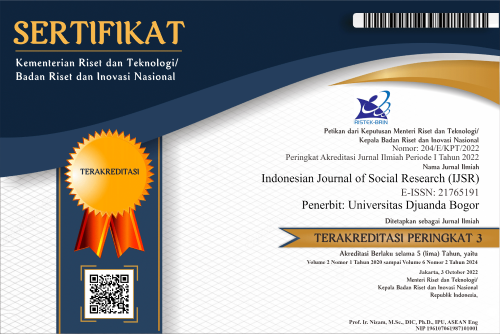The Role of Local Community and The Barriers to Participation in A Mini Hydro Energy Project in Indonesia
Abstract
The Indonesian government's policy to encourage the involvement of private companies to contribute to renewable energy (RE) projects affects the lives of the local community in the surrounding areas. However, the local community's role in the RE project implementation must be clarified. The study identifies a possible role for the local community to participate in the RE project. It examines the barriers to its participation under the lens of public-private-people partnership. The study was conducted in a mini hydro power plant project in Indonesia. Eight representatives from the village government, community members, and company management were interviewed. The data were analyzed and presented in a descriptive-qualitative manner. The study found that local community participation is needed to manage water as a natural resource for mini hydro power plants. Still, the need for explicit agreement on responsibility and benefit-sharing between the local community, village government, and private companies becomes the barrier to community participation. The findings emphasize the need for formal partnership to specify how local government, private businesses, and communities supposedly develop renewable energy as the basis to involve stakeholders at the local level.
References
Adegbite, E., Amaeshi, K., Johnston, A., & Osuji, O. (2019). Corporate Social Responsibility as Obligated Internalisation of Social Costs. Journal of Business Ethics, 170(1), 39-52. 10.1007/s10551-019-04329-y.
Batidzirai, B., Trotter, P. A., Brophy, A., Stritzke, S., Moyo, A., Twesigye, P., Puranasamriddhi, A., & Madhlopa, A. (2021). Towards people-private-public partnerships: An integrated community engagement model for capturing energy access needs. Energy Research & Social Science, 74, 101975. https://doi.org/10.1016/j.erss.2021.101975
Buchori, I., Zaki, A., Pangi, P., Sejati, A. W., Pramitasari, A., & Liu, Y. (2022). Adaptation strategies and community participation in government-led mitigation projects: A comparison between urban and suburban communities in Pekalongan, Indonesia. International Journal of Disaster Risk Reduction, 81, 103271. 10.1016/j.ijdrr.2022.103271
Chen, W., He, B., Nover, D., Duan, W., Luo, C., Zhao, K., & Chen, W. (2018). Spatiotemporal patterns and source attribution of nitrogen pollution in a typical headwater agricultural watershed in Southeastern China. Environmental Science and Pollution Research, 25, 2756–2773. https://doi.org/10.1007/s11356-017-0685-8
Fathoni, H. S., Setyowati, A. B., & Prest, J. (2021). Is community renewable energy always just? Examining energy injustices and inequalities in rural Indonesia. Energy Research & Social Science, 71, 101825. https://doi.org/10.1016/j.erss.2020.101825
Guerreiro, S., & Botetzagias, I. (2018). Empowering communities–the role of intermediary organisations in community renewable energy projects in Indonesia. Local Environment, 23(2), 158–177. https://doi.org/10.1080/13549839.2017.1394830
Gustafsson, C., & Amer, M. (2023). Forsvik, Sweden: Towards a People–Public–Private Partnership as a Circular Governance and Sustainable Culture Tourism Strategy. Sustainability, 15(5), 4687. https://doi.org/10.3390/su15054687
Hanafi, J., & Riman, A. (2015). Life cycle assessment of a mini hydro power plant in Indonesia: A case study in Karai River. Procedia Cirp, 29, 444–449. https://doi.org/10.1016/j.procir.2015.02.160
Herington, M., Van de Fliert, E., Smart, S., Greig, C., & Lant, P. (2017). Rural energy planning remains out-of-step with contemporary paradigms of energy access and development. Renewable and Sustainable Energy Reviews, 67, 1412–1419. https://doi.org/10.1016/j.rser.2016.09.103
Indonesia Clean Energy Development (ICED) Program. (2013, Juni 13). https://humas.ui.ac.id/sites/default/files/ICED-RFA-02-2013%20publication.pdf
Kennedy, S. F. (2018). Indonesia’s energy transition and its contradictions: Emerging geographies of energy and finance. Energy Research & Social Science, 41, 230–237. https://doi.org/10.1016/j.erss.2018.04.023
Kumaraswamy, M., Zou, W., & Zhang, J. (2015). Reinforcing relationships for resilience–by embedding end-user ‘people’in public–private partnerships. Civil Engineering and Environmental Systems, 32(1–2), 119–129. https://doi.org/10.1080/10286608.2015.1022727
Kusmarwati, A., Arief, F. R., & Haryati, S. (2014). Eksplorasi bakteriosin dari bakteri asam laktat asal Rusip Bangka dan Kalimantan. Jurnal Pascapanen Dan Bioteknologi Kelautan Dan Perikanan, 9(1), 29–40. https://doi.org/10.15578/jpbkp.v9i1.97
Law of the Republic of Indonesia Number 17 of 2019. (2019). Water resources
Laws of The Republic Indonesia Number 6 Of 2014. (2014). Village. https://www.dpr.go.id/dokjdih/document/uu/UU_2014_6.pdf
Leonard, L. (2019). Traditional leadership, community participation and mining development in South Africa: The case of Fuleni, Saint Lucia, KwaZulu-Natal. Land Use Policy, 86, 290–298. https://doi.org/10.1016/j.landusepol.2019.05.007
Lessy, M. R., Bemba, J., & Nagu, N. (2018). Assessing community resilience to natural disaster and climate change in Maitara Island, North Maluku-Indonesia. 229, 02002. https://doi.org/10.1051/matecconf/201822902002
Mane, A. (2019). Community Participation, Mitigation Flood Disaster in Indonesia. 271(1), 012031. https://doi.org/10.1088/1755-1315/271/1/012031
Marana, P., Labaka, L., & Sarriegi, J. M. (2018). A framework for public-private-people partnerships in the city resilience-building process. Safety Science, 110, 39–50. https://doi.org/10.1016/j.ssci.2017.12.011
Ministry of Energy and Mineral Resources. (2021, December 14). Minister of Energy and Mineral Resources: Needs Concrete and Planned Efforts to Achieve 23% Mix Target in 2025. [Press Conference]. https://ebtke.esdm.go.id/post/2021/12/15/3038/menteri.esdm.perlu.upaya.konkrit.dan.terencana.capai.target.bauran.23.di.tahun.2025
Ministry of Energy and Mineral Resources. (2020, February 7). Generating Capacity Increases to 69.6 GW, EBT Contributes 10.3 GW. https://ebtke.esdm.go.id/post/2020/02/10/2473/kapasitas.pembangkit.naik.jadi.696.gw.ebt.sumbang.103.gw
Muñoz, P., & Kimmitt, J. (2019). Social mission as competitive advantage: A configurational analysis of the strategic conditions of social entrepreneurship. Journal of Business Research, 101, 854–861. https://doi.org/10.1016/j.jbusres.2018.11.044
Novitasari, D., Hadi, S. P., & Budiarto, R. (2023). The climate and land-use changes impact on water availability for hydropower plants in Indonesia. Energy Strategy Reviews, 46, 101043. https://doi.org/10.1016/j.esr.2022.101043
Nyanti, L., Soo, C.-L., Chundi, A.-Y., Lambat, E.-C.-D., Tram, A., Ling, T.-Y., Sim, S.-F., Grinang, J., Ganyai, T., & Lee, K.-S.-P. (2021). Patterns of Fish Assemblage, Growth, and Diet Composition in a Tropical River between Two Cascading Hydropower Dams. International Journal of Ecology, 2021, 1–10. https://doi.org/10.1155/2021/6652782
Poncian, J., & Jose, J. (2019). National resource ownership and community engagement in Tanzania’s natural gas governance. Energy Policy, 133, 110903.
Prilandita, N., Sagala, S., Azhari, D., & Habib, A. (2022). Rural renewable energy development: Lessons learned from community-based renewable energy business model in East Sumba, Indonesia. 1015(1), 012017. https://doi.org/10.1088/1755-1315/1015/1/012017
Scherer, A. G., Baumann-Pauly, D., & Schneider, A. (2013). Democratizing corporate governance: Compensating for the democratic deficit of corporate political activity and corporate citizenship. Business & Society, 52(3), 473–514. https://doi.org/10.1177/0007650312446931
Setyowati, A. B. (2020). Mitigating energy poverty: Mobilizing climate finance to manage the energy trilemma in Indonesia. Sustainability, 12(4), 1603. https://doi.org/10.3390/su12041603
Shirley, R. G., & Word, J. (2018). Rights, rivers and renewables: Lessons from hydropower conflict in Borneo on the role of cultural politics in energy planning for Small Island Developing States. Utilities Policy, 55, 189–199. https://doi.org/10.1016/j.jup.2018.09.010
Silber-Coats, N. (2017). Clean energy and water conflicts: Contested narratives of small hydropower in Mexico’s Sierra Madre Oriental. 10(2). 578-601
Stickler, C. M., Coe, M. T., Costa, M. H., Nepstad, D. C., McGrath, D. G., Dias, L. C., Rodrigues, H. O., & Soares-Filho, B. S. (2013). Dependence of hydropower energy generation on forests in the Amazon Basin at local and regional scales. Proceedings of the National Academy of Sciences, 110(23), 9601–9606. https://doi.org/10.1073/pnas.1215331110
Tesfaw, A. T., Pfaff, A., Golden Kroner, R. E., Qin, S., Medeiros, R., & Mascia, M. B. (2018). Land-use and land-cover change shape the sustainability and impacts of protected areas. Proceedings of the National Academy of Sciences, 115(9), 2084–2089. https://doi.org/10.1073/pnas.1716462115
Theyyan, B. (2018). Arnstein’s ladder of citizen participation a critical discussion. Asian Academic Research Journal of Multidisciplinary, 2(7).
Whitton, J., Parry, I. M., Akiyoshi, M., & Lawless, W. (2015). Conceptualizing a social sustainability framework for energy infrastructure decisions. Energy Research & Social Science, 8, 127–138. https://doi.org/10.1016/j.erss.2015.05.010
Xue, Y., Lindkvist, C. M., & Temeljotov-Salaj, A. (2021). Barriers and potential solutions to the diffusion of solar photovoltaics from the public-private-people partnership perspective–Case study of Norway. Renewable and Sustainable Energy Reviews, 137, 110636. https://doi.org/10.1016/j.rser.2020.110636
Copyright (c) 2023 Indonesian Journal of Social Research (IJSR)

This work is licensed under a Creative Commons Attribution-ShareAlike 4.0 International License.
The Authors submitting a manuscript do so on the understanding that if accepted for publication, copyright publishing of the article shall be assigned/transferred to Indonesian Journal of Social Research (IJSR) Universitas Djuanda as Publisher of the journal. Upon acceptance of an article, authors will be asked to complete a 'Copyright Transfer Agreement'. An e-mail will be sent to the corresponding author confirming receipt of the manuscript together with a 'Copyright Transfer Agreement' form by online version of this agreement.
Indonesian Journal of Social Research (IJSR) Universitas Djuanda, the Editors and the Editorial Board make every effort to ensure that no wrong or misleading data, opinions or statements be published in the journal. In any way, the contents of the articles and advertisements published in the Indonesian Journal of Social Research (IJSR) Universitas Djuanda are sole and exclusive responsibility of their respective authors and advertisers.
Remember, even though we ask for a transfer of copyright, our journal authors retain (or are granted back) significant scholarly rights as mention before.
The Copyright Transfer Agreement (CTA) Form can be downloaded here: Copyright Transfer Agreement-IJSR 2020
The copyright form should be signed electronically and send to the Editorial Office e-mail below:
Dr. Rasmitadila, M.Pd (Editor-in-Chief)
Universitas Djuanda
Jl. Tol Jagorawi No.1, Ciawi, Kec. Ciawi, Bogor, Jawa Barat 16720
Website: http://journal.unida.ac.id/index.php/IJSR/index
Email: ijsr@unida.ac.id





4.png)



